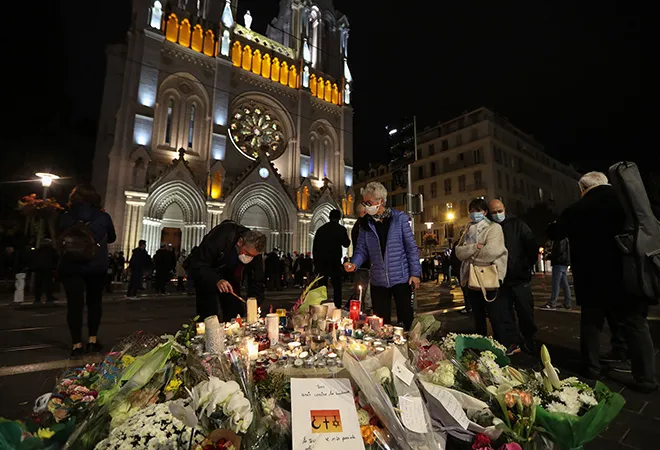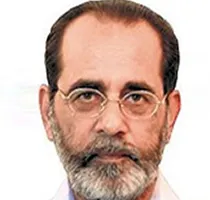-
CENTRES
Progammes & Centres
Location
The challenge for France is not easy. The idea that education, hard work and following French laws and customs led to upward mobility has been challenged in recent years and Covid-19 has only highlighted it

France has faced its own share of terrorist attacks, including from among its own radicalised Muslims. The latest cycle, which has left the country in shock, began with the beheading of Samuel Paty, a school teacher on October 16, killed by an 18-year-old Chechen refugee who was enraged because Paty had shown caricatures of Prophet Mohammed during his lecture on “free speech” to students, after advising them that those offended could leave. This was followed by a fatal stabbing of three, in a church in Nice by a 21-year-old recently-arrived Tunisian migrant on October 29.
President Emmanuel Macron’s statement at Paty’s memorial service describing him as a symbol of “freedom and reason” and vowing that French freedom of expression means that “we will not give up our cartoons” has provoked angry reactions from Muslims in other countries, fuelled by incendiary responses from Turkish President Recep Tayyip Erdogan, Pakistani Prime Minister (PM) Imran Khan and Malaysian leader Mahathir bin Mohamed.
Erdogan said that “Macron needs a mental health check” and called for a boycott of French goods, leading France to recall its ambassador in protest. Behind his animus are growing differences on Turkish military interventions in Libya, in eastern Mediterranean against Greece and in supporting Azerbaijan against Armenia.
If France sees itself as the torchbearer for democratic, liberal and secular values, Turkey under Erdogan (who has been in power since 2003 and ensured his continuation till 2028 through constitutional manipulations) has reversed the Ataturk reforms of the 1930s to reclaim its Islamic identity and role in a neo-Ottoman avatar.
Imran Khan, facing domestic political unrest, issued a series of tweets blaming Macron for “hurting the sentiments and provoking millions of Muslims”. Parliament passed resolutions seeking the recall of its ambassador from Paris before realising that the new appointee hadn’t even joined. Mahathir Mohamed’s tweet that Muslims have the right “to kill millions of French people for the massacres of the past” was taken down by Twitter for being offensive. Ironically, none of them has uttered a word about the incarceration of a million Uighur Muslims by China.
Other European countries demonstrated solidarity. Germany, the UK, Italy and the Netherlands issued strong statements of support. In Delhi, the ministry of external affairs issued a statement “deploring the personal attacks” on Macron while condemning the “brutal terrorist attack” on Paty. PM Narendra Modi condemned the terrorist act conveying solidarity with France, even as foreign secretary Harsh Vardhan Shringla was in Paris for talks where the radicalisation of Muslim communities would have been discussed.
Secularism or laicite, separating religion and State, was legalised in France in 1905. A 2004 law prohibits the ostentatious display of “conspicuous religious symbols” in public institutions. While it alienated sections of Muslims by prohibiting the hijab, it applied to Catholics wearing a large cross or Jews wearing the yarmulke (skull-cap). Faith was restricted to the home to promote civic nationalism, in keeping with the sense of French exceptionalism.
France is home to six million Muslims, the largest concentration in Europe. It has been aware of growing radicalisation in certain sections of the community. Earlier this month, in a long-awaited speech on October 2, Macron cautioned about the risks of Islamic separatism leading to a “counter-society” and said that new legislation would be introduced to prevent it. This would include measures to improve prospects for socio-economic mobility, tighter controls on financing and instruction in mosques and madrassas as well as monitoring cultural and sports organisations. The suggestion that Islam was “in crisis” and needed its own “enlightenment” elicited a mixed response within France but little comment outside.
The challenge for France is not easy. The idea that education, hard work and following French laws and customs led to upward mobility has been challenged in recent years and Covid-19 has only highlighted it. A recent opinion poll among Muslims in France revealed that while an encouraging 60% believed that freedom of expression should include satire, the same poll also indicated that over 75% were unwilling to include caricatures of Prophet Muhammed as acceptable satire. This is the gap that Marine Le Pen, Macron’s most likely opponent in the 2022 election, will exploit with her populist, nationalist and anti-European Union platform. This is also the gap that Macron needs to bridge with his proposed legislative initiative.
This commentary originally appeared in The Hindustan Times
The views expressed above belong to the author(s). ORF research and analyses now available on Telegram! Click here to access our curated content — blogs, longforms and interviews.

Ambassador Rakesh Sood was a Distinguished Fellow at ORF. He has over 38 years of experience in the field of foreign affairs economic diplomacy and ...
Read More +